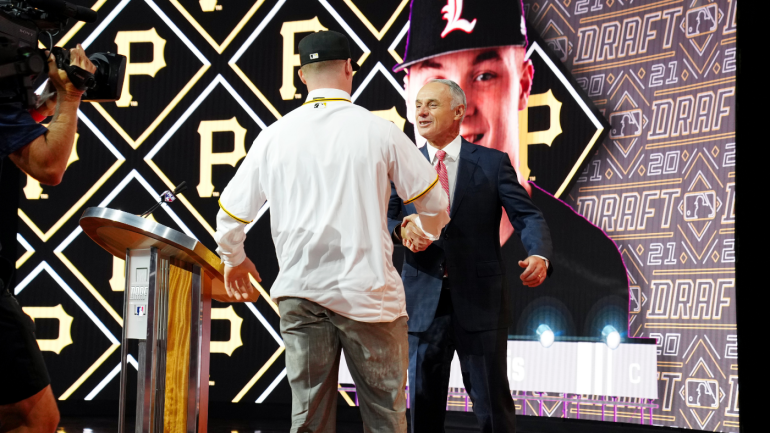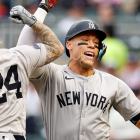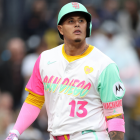
Major League Baseball completed its 2021 amateur draft on Tuesday. The three-day, 20-round event began on Sunday night at the Bellco Theatre in Denver, when the Pittsburgh Pirates used their fifth No. 1 pick in franchise history to select Louisville catcher Henry Davis.
Hundreds upon hundreds of names have since been called, including familiar ones like Washington Nationals draftee Darren Baker. CBS Sports had you covered with takeaways from day one and two of this year's draft.
Judging a draft at its conclusion is silly in any context, and borders on ridiculous in baseball, where even the most promising youngsters spend several years in the minors. For evidence of this, reflect upon how everyone but the Texas Rangers whiffed on Evan Carter last summer. Nonetheless, sometimes you have to ignore your better angels to appease the content gods.

CBS Sports HQ Newsletter
Your Ultimate Guide to Every Day in Sports
We bring sports news that matters to your inbox, to help you stay informed and get a winning edge.
Thanks for signing up!
Keep an eye on your inbox.
Sorry!
There was an error processing your subscription.
With that in mind, we're here to get foolish with it by naming some apparent winners and losers of the 2021 MLB draft.
Winner: Pittsburgh Pirates
The team with the top pick and the largest bonus pool in the class should walk away from the draft looking like a winner. Still, we'll give the Pirates props for executing the portfolio approach (popularized over the last decade by the Houston Astros and Baltimore Orioles) to a tee.
The Pirates ostensibly saved money by selecting Davis instead of Marcelo Mayer, Jack Leiter, or Jordan Lawlar. They then used those savings to select three other players who were on CBS Sports' pre-draft top-50 list: lefty Anthony Solometo, outfielder Lonnie White Jr., and righty Bubba Chandler.
There is room for disagreement on how wise it is to take this route versus the traditional path, which entails taking the best player at the top regardless of what it does to the rest of the class. If you're of the belief that Davis is a prospect of a similar caliber to the other candidates at No. 1 -- and this draft lacked a clear-cut No. 1 pick -- then this is probably a smart call.
Whether or not Davis occupies that space depends on the judge. One veteran talent evaluator (who doesn't work for the Pirates) floated him to CBS Sports as a dark horse for the No. 1 spot back in February. Their reasoning went like this: Davis is at least an adequate, big-armed catcher who seldom swings and misses and who frequently makes loud contact. That's a nice combination.
Other evaluators have expressed concerns about the portability of Davis' strength-based swing, and about his outlook at the catcher position. He should be aided by the expected implementation of the automated ball-strike system in the next Collective Bargaining Agreement, but it's at least theoretically possible that he has to move to another position over the coming years.
The Pirates, presumably, are closer to the first evaluation's read on Davis. If they're right on him -- and their other early picks -- they could look back on this draft as a turning point for the franchise.
Loser: Houston Astros
As with last year, the Astros had their first- and second-round picks stripped by MLB as punishment for their sign-stealing misconduct. That left Houston with the lowest bonus pool in the league, limiting what it could do once it was finally allowed to make a pick. Getting Tyler Whitaker at 87 seems like a win, just not a big enough one to land the Astros on the right side of the ledger.
Winner: Boston Red Sox
The Red Sox didn't pick until fourth, but they arguably walked away with the best prospect in the draft, in California prep shortstop Marcelo Mayer. Later, Boston took a chance on Jud Fabian, a Florida outfielder who was expected to be a top-five pick entering the spring, and who could've easily snuck into the back of the first round. Sometimes the board just smiles upon you.
Loser: College football teams
There were three two-sport commitments who cracked our top-50: Will Taylor (Clemson), Bubba Chandler (Clemson), and Lonnie White Jr. (Penn State). Two of the three were drafted by the Pirates at slots that suggest they'll be signing. Taylor, who was viewed as a plausible top-10 candidate, will be the exception.
Winner: Detroit Tigers
To paraphrase what we wrote in the Pirates section, if you pick third you should come away with a good-looking class. Truthfully, we're not as sweet on Detroit's class as others will be because of the wide error bars on some of the players at the top of their class, but the Tigers did appear to get good value by following up their selection of Jackson Jobe at No. 3 with Ty Madden at No. 32, Izaac Pacheco at No. 39, and Dylan Smith at No. 74. Pacheco is the only one of the four who didn't make our pre-draft top-50, and, even then, he was under consideration until late in the process.
Loser: Prep shortstops
As we noted after the first night, this draft seemed likely to be dominated by high-school shortstops. Between Marcelo Mayer, Jordan Lawlar, Kahlil Watson, and Brady House, they made up 40 percent of our pre-draft top-10. Yet on Sunday, each slid down the board. Mayer, who was considered by us to be the top player in the class, went No. 4; Lawlar dropped to No. 6; House to No. 11; and Watson to No. 16. That shouldn't prove to be too costly -- the slot value of the 16th spot is still close to $4 million -- but it was unexpected.
Winner: Cincinnati Reds
There were any other number of candidates for this slot, but we'll give the final nod to the Reds, who had five picks in the top-100. They made them count, catching a falling Matt McLain (who was expected to go in the top dozen), as well as grabbing outfielder Jay Allen, catcher Matheu Nelson, left-hander Andrew Abbott, and shortstop Jose Torres -- all of whom were top-50 candidates.






















